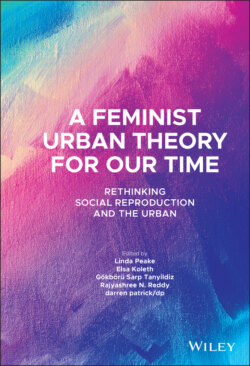Читать книгу A Feminist Urban Theory for Our Time - Группа авторов - Страница 12
ОглавлениеPreface
As feminist, Marxist, postcolonial and queer scholars, our concern in this book is to show how social reproduction is foundational in comprehending urban transformation. Social reproduction is, of course, not just an analytical framing but also an organizing call for feminist scholars and our contention is that if we want an urban theory for our time, it needs to be feminist. Feminism is not simply a ‘discipline’, ‘theory’, or ‘ideology’, but a worldview, a lived praxis that provides a platform for engaged analysis.
The book’s origins lie in our belief in the necessity of feminist urban knowledge production, a belief further endorsed by our prior critical engagement with the analytical framework of planetary urbanization and our collective ruminations during and post this engagement on the nature of urban theory (Reddy 2018; Ruddick et al. 2018). Not least the considerable response to the theme issue of Society and Space (Peake et al. 2018) showed us that there was an audience desirous of troubling the hegemony of urban theory. Moreover, our approach of working as a team across hierarchies of junior and senior scholars, generations, genders, sexualities, institutions, and disciplines – a praxis we refer to as ‘the intergenerational social reproductive labor of knowledge production’ (Peake et al. 2018, p. 377) – had been fruitful and positive and we wanted it to continue. It was as much a pedagogical experience of reading and writing together, and sharing meals, as it was an exploration of our places within the academy and an intellectual foray into urban theory. And while Roza Tchoukaleyska left for Newfoundland, Elsa Koleth, a new post-doctoral fellow at the City Institute at York University, joined us.
Our Canadian location, although mediated by our own migrations from Australia, India, Turkey, the United Kingdom, and the United States, led us to put out a call for papers in 2018 on the theme of a ‘feminist urban theory for our time’ at the annual conferences of the Canadian Association of Geographers, the American Association of Geographers, and the Urban Affairs Association. Some of our contributors answered these calls for conference papers, while others are members of the GenUrb (SSHRC-funded) project (Urbanization, gender and the global south: a transformative knowledge network). Much has been written in urban scholarship by feminist and postcolonial scholars on global circuits of knowledge production and the privileging of Anglo-American scholarship. We recognize that sending conference calls to those attending North American based conferences not only reduces the geographic locations of the research reported but also heightens whiteness as a political and epistemological position and that this volume is thereby limited in its capacity to pluralize and broaden the epistemic community engaged in feminist urban theory. Nonetheless, our authors come from Colombia, Germany, Greece, Iran, Palestine, Puerto Rico, and South Africa as well as Canada, the United States, and the United Kingdom. And they report on research based in cities in Argentina, Canada, Columbia, Greece, Haiti, Indonesia, Kenya, Palestine, Puerto Rico, Spain, the United Kingdom, the United States, Zambia, and Zimbabwe.
Collectively, the contributors explore how the urban can be understood through the light shone on the dynamics of social reproduction in people’s everyday lives and their interaction with processes of capitalist accumulation as they are actively reconfigured through the manifold processes of contemporary urbanization. They proffer the insight that a feminist social reproduction approach to the urban offers not only an engaged analysis of the variegated nature of the urban but also of the relationship between capitalism and the production of social difference. With a focus on the everyday urban contexts within which social reproduction takes place, the various contributions make visible the insidious, often unacknowledged, and seemingly innocuous ways in which lives are being transformed, highlighting the moral economies within which these contexts are normalized and rendered ordinary rather than unlivable.
As we wrote, the pandemic conditions that have gripped the globe in the most catastrophic and intimate ways have cast many of the processes discussed in this book into sharp and brutal relief. We are reminded once again of the absolute necessity of social reproduction for human survival, of the fragility of the infrastructures and bodies that make social reproduction possible, and of the grossly unjust systems of power that secure the social reproduction of the few through the disposability, expulsion, and annihilation of many others. Whether seen through the near collapse of health and welfare systems in urban centres already ravaged by austerity, the mass exodus of impoverished migrant workers back to rural villages, or the significant reductions in women’s participation in numerous labour forces, the prevailing crises of social reproduction around the world have been exacerbated exponentially in current conditions.
Finally, we would like to acknowledge the work undertaken by the contributors to this book, a number of them junior scholars, as well as their patience in revising various drafts of their chapters. We also thank Antipode’s book series editors, Sharad Chari and Vinay Gidwani, who started the process of creating this book with us and Nik Theodore who saw us through to the end, for their interest in our project and providing us with the opportunity to pursue it through to its publication.
Linda Peake, Rajyashree N. Reddy, Gökbörü Sarp Tanyildiz, Elsa Koleth, and darren patrick/dp
References
1 Peake, L., Patrick, D., Reddy, R., Tanyildiz, G., Ruddick, S., and Tchoukaleyska, R. (2013). Placing planetary urbanization in other fields of vision. Environment and Planning D: Society and Space 36 (3): 374–386. doi: 10.1177/0263775818775198
2 Reddy, R.N. (2018). The urban under erasure: Towards a postcolonial critique of planetary urbanization. Environment and Planning D: Society and Space 36 (3): 529–539.
3 Ruddick, S., Peake, L., Patrick, D., and Tanyildiz, G.S. (2018) Planetary urbanization: An urban theory for our time? Environment and Planning D: Society and Space 36 (3): 387–404. doi: 10.1177/0263775817721489
